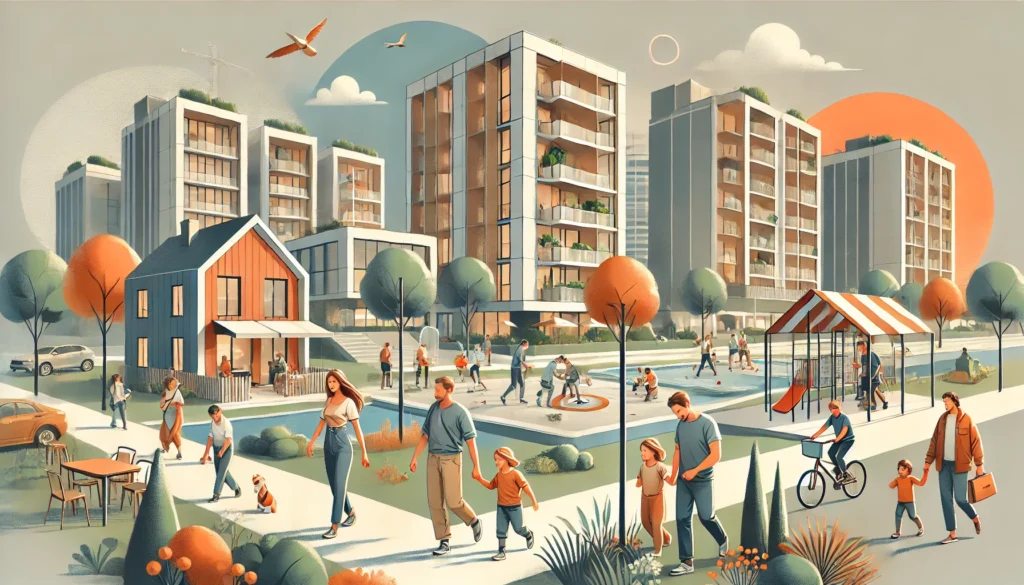
At Honesta, we believe that zoning is the foundation of successful real estate development. Zoning laws determine what can be built, where, and how. Even the best-conceived projects can face delays, legal complications, or complete halts without a thorough understanding of these regulations. That’s why we prioritize zoning research early in our development process, ensuring that every project aligns with local codes and contributes positively to the community.
Zoning laws guide the development of cities and towns. These regulations establish where homes, businesses, and industrial spaces can exist. They also dictate building height, density, and usage, shaping the character of entire neighborhoods. For developers, zoning is a vital tool for planning, allowing us to create spaces that meet community needs and market demands.
Why Zoning is Critical to Real Estate Development Approach
At Honesta, we approach every project with a focus on community. Zoning laws play a key role in dictating what types of buildings can be constructed and how they integrate into the surrounding area. For example, when we develop residential communities, zoning laws ensure that our designs fit the neighborhood’s scale and character. Failure to adhere to these rules can lead to project delays, community resistance, or costly redesigns.
Zoning also affects the financial viability of a project. Land designated for commercial use often holds higher value than residential or agricultural land. For Honesta, understanding these distinctions allows us to make informed investment decisions. We strategically choose properties that align with both zoning regulations and market potential, ensuring a smooth development process from start to finish.
How Zoning Categories Influence Development Projects
Zoning regulations fall into several key categories: residential, commercial, industrial, and mixed-use. Each type has its own set of rules and guidelines, which can vary from one city or town to another.
When Honesta takes on a residential project, we navigate the complexities of residential zoning. These laws cover everything from the number of units allowed on a lot to building height and setbacks. We ensure that every home, townhouse, or apartment we build complies with local codes to avoid legal issues and unnecessary delays.
For our commercial projects, zoning laws dictate building size, parking requirements, and signage regulations. Whether we’re developing retail spaces, office buildings, or restaurants, we work closely with local authorities to ensure that our plans align with commercial zoning standards.
Honesta has also ventured into mixed-use developments, which are governed by more complex zoning laws. These projects combine residential, commercial, and sometimes even industrial spaces, fostering community engagement. Our mixed-use developments are carefully planned to fit within zoning laws while promoting a vibrant, interconnected environment.
Environmental Considerations
At Honesta, sustainability is a core value, and zoning laws play a crucial role in environmental protection. Many municipalities have strict zoning regulations designed to preserve natural resources, such as wetlands, forests, and coastal areas. Honesta adheres to these regulations to ensure that our projects have a minimal environmental impact.
In some cases, our projects require environmental impact assessments (EIAs). These assessments evaluate how the development will affect the surrounding area, including air and water quality, wildlife, and noise levels. Honesta’s commitment to sustainability means that we go beyond just meeting the minimum zoning requirements; we strive to enhance the environment through thoughtful design and planning.
Variances & Rezoning
While zoning laws provide structure, they aren’t always perfectly aligned with Honesta’s development goals. In such cases, we pursue zoning variances or rezoning requests to create more flexible opportunities for our projects.
A zoning variance allows us to request an exception to the local zoning laws. For example, we may seek a height variance to build taller structures in areas where zoning laws limit building height. These requests are handled carefully, as they require approval from local zoning boards. Honesta engages with the community early to address concerns and increase the likelihood of approval.
Rezoning is another option we explore when necessary. This process involves changing the zoning designation of a piece of land. While rezoning can open new possibilities, it’s more complex and often requires public hearings and government approvals. Honesta approaches rezoning strategically, presenting strong cases that highlight the community benefits of our projects while aligning with broader urban planning goals.
Challenges: Honesta’s Best Practices
At Honesta, we have developed a set of best practices for navigating zoning challenges. These practices ensure that our projects move forward efficiently while maintaining strong relationships with local communities and governing bodies.
1. Start with Research: Before we break ground, Honesta thoroughly researches the zoning laws that apply to the land we’re developing. This early step helps us avoid costly redesigns or legal battles down the road.
2. Collaborate with Local Authorities: Zoning laws can vary widely from one location to another. Honesta works closely with local zoning boards and planning departments to understand their specific requirements. This collaboration ensures smoother project approval and community support.
3. Consult Legal Experts: Zoning regulations are often complex and difficult to navigate. Honesta employs legal experts who specialize in real estate development to guide us through the approval process and ensure compliance with local laws.
4. Engage the Community: At Honesta, community involvement is at the heart of everything we do. We engage with local residents and stakeholders early in the development process to address concerns, build trust, and secure support for our zoning requests.
5. Prepare for Alternatives: Zoning approvals aren’t guaranteed, and sometimes requests for variances or rezoning are denied. Honesta always prepares contingency plans, ensuring that our projects can adapt and move forward without major disruptions.
The Role of Zoning in Successful Developments
Zoning is more than a set of restrictions; it’s a tool that shapes communities. At Honesta, we see zoning as an essential part of creating developments that serve both the community and our investors. By understanding and respecting zoning laws, we ensure that our projects are not only compliant but also aligned with the broader goals of urban planning and community development.
Whether we’re working within the framework of existing zoning laws or seeking changes through variances and rezoning, Honesta approaches every project with a commitment to excellence. Zoning laws help us create spaces that are functional, sustainable, and valuable to the communities they serve.
Our ability to navigate zoning regulations efficiently contributes to the success of our projects. Honesta’s approach combines careful planning, legal expertise, and community engagement, ensuring that our developments meet the highest standards of compliance and sustainability.
Community-Centric Development
Zoning laws are at the core of every successful real estate development. At Honesta, we recognize the importance of understanding and adhering to these regulations to deliver projects that benefit both investors and communities. By working within the framework of zoning laws and seeking flexibility when needed, Honesta consistently develops spaces that are not only compliant but also impactful.
Our projects reflect a deep commitment to sustainability, community, and innovation. Understanding zoning allows Honesta to create developments that are more than just buildings—they are vibrant, functional communities designed with intention and care.



